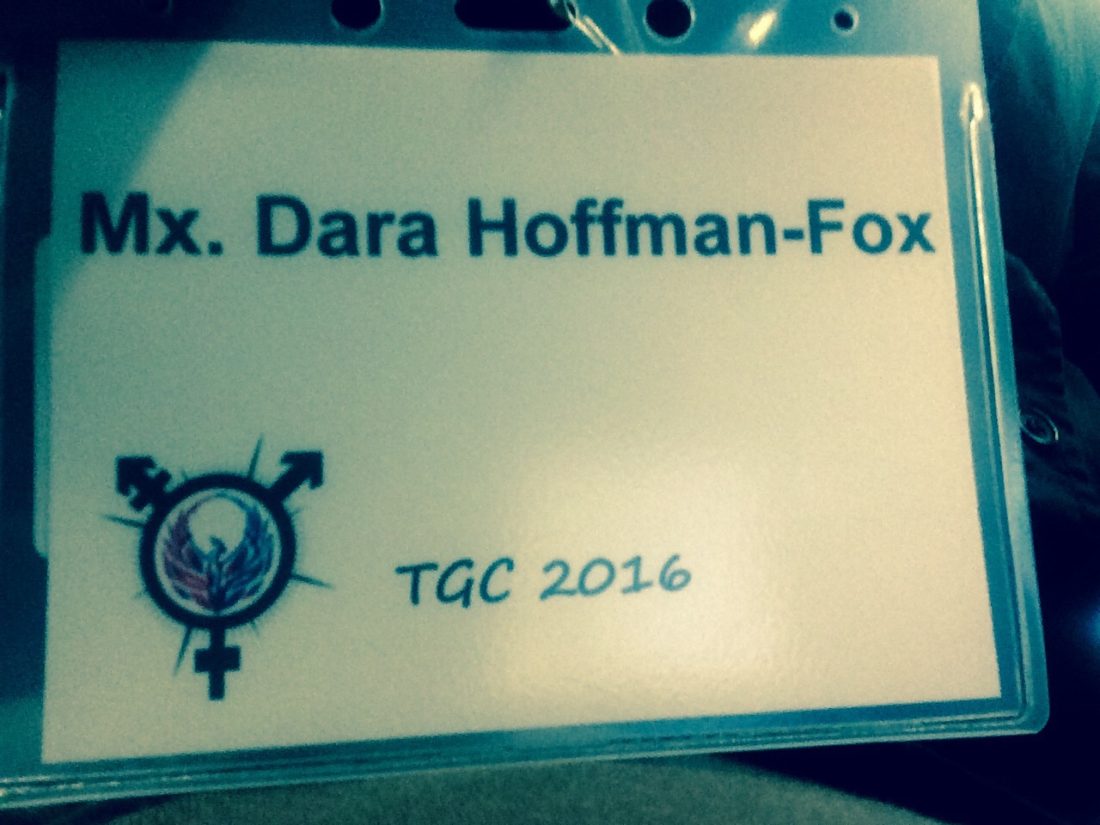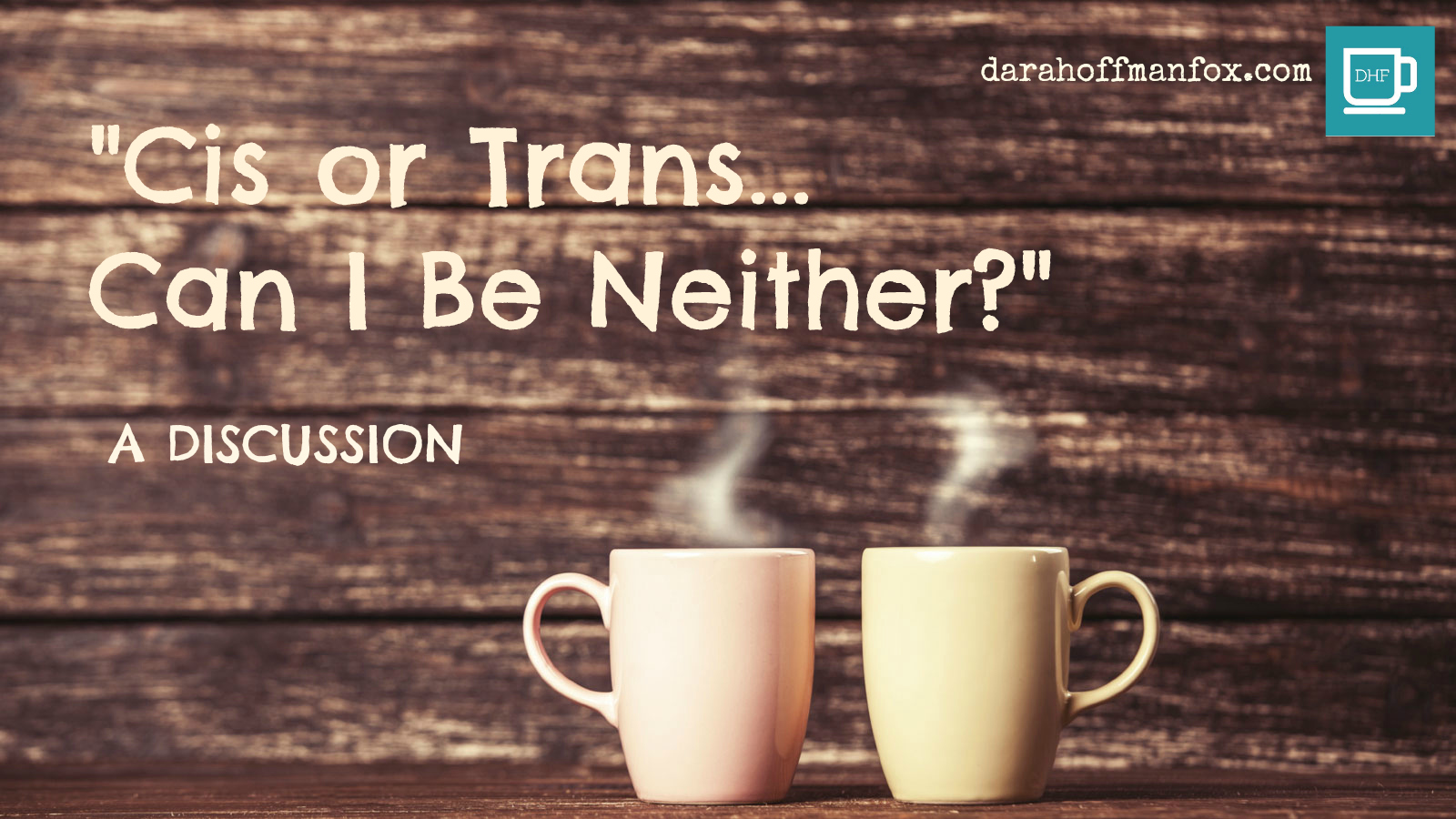
“Cis or Trans…Can I Be Neither?”: A Discussion

I recently began a discussion online regarding the question: “Cis or Trans…Can I Be Neither?” I was excited by how much response it got, so I wanted to share the various discussions all in one place.
Here are the responses from the general post I made on my Facebook page, Conversations with a Gender Therapist (click on the message bubble to go to the comments from the post):
A question that has been ringing around in my head ever since I left the TRANSforming Gender Conference in Boulder…
Posted by Conversations with a Gender Therapist on Sunday, March 13, 2016
Here is a YouTube video I made with the same question, along with more detail as to why I wanted to ask the question. You’ll need to go to the actual YouTube page to see the ongoing discussion about it:
Here are the responses from when I posted the YouTube video onto my Facebook page (click on the message bubble to go to the comments from the post):
If someone is not cisgender does that automatically mean they are trans/transgender? I'm asking my YouTube followers to engage in a conversation in the comments to see what they think. I hope you'll join in!
Posted by Conversations with a Gender Therapist on Monday, March 14, 2016
The conversations around this topic did indeed help clarify things for me, when it came to my own answer to this question.
I’ve concluded (at least for now!) that it all depends on how one personally defines “trans/transgender.” For me, the definition of “trans/transgender” means to go “beyond” one’s assigned-gender-at-birth. Since I feel genderless/agender/neutrois, it means there is no gender in the first place for me to go “across” or “beyond.” Therefore I do feel I can identify as neither cisgender nor transgender.
However, I am also aware that I live in a world with other people, and that some of those people might want to categorize me in a certain way. Depending on the situation, if I am asked to “choose” between being either cisgender or transgender, I know that transgender describes me more closely than cisgender and therefore I would default to that (again, if necessary).
Hope you will join in on the conversation either in the comments below or in the discussions that have already been started on Facebook and YouTube!




Arya
July 3, 2016 at 6:27 AM“For me, the definition of “trans/transgender” means to go “beyond” one’s assigned-gender-at-birth. Since I feel genderless/agender/neutrois, it means there is no gender in the first place for me”
You werent assigned gender at birth? Then, you aren’t going beyond assigned-gender-at-birth?
The important question here is: do you have cis privileges? do you suffer trans opression? That’s teh important part, and not the label you use. You can use the label you want as long you recognice the privileges you have (if you have them) or the oppression that other people suffer (if you don’t suffer).
You don’t need to put a label to you at all. But you still will suffer opression or have privileges. The important thing is to not negate a lavel just in order to negate this opression/privileges.
Dara Hoffman-Fox
July 3, 2016 at 3:49 PMYes, I most definitely have cis privilege – which is also a big reason I don’t feel “transgender” is a term I can use comfortably for myself. So, although the other points I make are valid, this is one as well. Good catch, thanks for bringing it up!
Dede River
April 16, 2017 at 6:34 AMDo people who “pass” have cis privilege? Do people who identify as the gender assigned at birth but continually get seen as another gender not have cis privilege?
People who are passable and stealth may have “cis privilege” but only at the cost of denial of their history.
Transgender is not like gay.
There is also the issue of identity where people who “are trans” identify as a gender, feel “visible” when they are seen as that gender. They *don’t* identify, or wish to be seen as, “transgender” “Transgender” is what they are, not how they see themselves.
Dede River
April 16, 2017 at 6:04 AMThere are two sorts of identity, the kind that one creates, and the kind that is applied to us. E.G. Black is an identity created by those calling themselves white, that is imposed on various people, often of substantially different skin colour and culture. It’s a created, and socially imposed identity, used to divide and condemn. Black is also an identity people apply to themselves, generally based o a common experience of oppression and as a form of defiance. But in applying to self, people sometimes divide things, into identities like bi-racial, etc.
Trans is an identity. I’m old, and remember the debates on alt.transgender, soc.support.ts, etc. Various identities were created, including cisgender. But the identites were created, by us, to describe feelings. They aren’t cast in stone.
Thinking a lot in relation to gender diverse, and the proliferation of identities, with flags even :), it seems to me that we need to remember that male and female are identities, socially constructed. And they aren’t especially solid, or case in stone. Women, feminists, worked hard for years to deconstruct gender.
After all, what is “woman”. I know very masculine women who work on oil rigs, are lesbians, and do butch (another identity). Yet they see themselves (idedentify) as women, and people see them as women. Woman is an extremely diverse identity. It covers a huge range of presentations and activities. Women can wear virtually anything without being seen as “cross dressing”. They are just dressing. They can do all sorts of jobs, live alone or with people of various genders and sexualities. It’s not a very rigid gender identity.
I often say to those who want to identify as women, that the thing they need to consider is what kind of woman they want to identify as.
Man is more rigid, but increasingly has a pretty broad range. No real need to identify as some macho guy. It’s generally not appreciated.
Lots of gender diverse people choose to identify as non-binary. I’m not really sure what that means, except it is “not male of female” except those terms are generally taken as some extreme version of those identities.
Some people choose very defined identities, complete with gender, sexuality, relationship identities, romantic styles. .I suggest not getting too caught up. Be yourself. You are unique.
In the queer theory days, people did a lot of identity stuff. I like the topographical model, where things like “male” or “straight” were seen as landmarks on a terrain of identity, something we are closer to or further away from. No one is the mountain. And be flexible. Trans or t* was enough, once. It’s only since there are so many people that are some kind of trans that we start making names and identities to describe the differences.
My own favourite notion is that everyone is, to some degree, gender diverse. We all do our own gender. If we see male as, for example, Shanghai, and female as San Francisco, then we are all swimming in the ocean, no matter whether we say we are aligned with China or the California, how close or how far we range. And some of us would rather say, “Blow it, I’m off to Tahiti”. We’re all dolphins at heart.
Dede River
April 16, 2017 at 6:21 AMThe biggest problem with identity is when someone tries to say what it is and isn’t, and start telling some people they are doing it wrong, that they can’t call themselves this or that.
We don’t need identity police. Identity is who we are. We can’t do it wrong.
Dede River
April 16, 2017 at 6:52 AMAnother thought: We need to remember that intersexed people don’t generally see themselves as transgender or cisgender. And some see themselves as definitely third gender, hermaphrodite, or epicene.